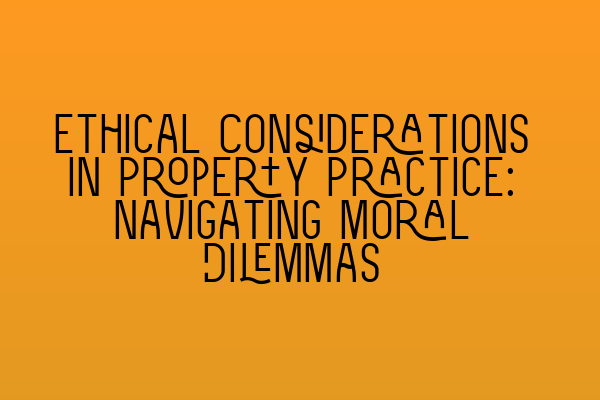Welcome to the SQE Property Law & Land Law blog! In this post, we will be exploring the ethical considerations that arise in property practice and the importance of navigating moral dilemmas. As a solicitor, it is crucial to uphold ethical standards and act in the best interests of your clients while also maintaining a sense of integrity and accountability. Let’s dive in!
The Role of Ethics in Property Practice
Property law is a complex practice area that often involves high-stake transactions and disputes. As a property solicitor, you are entrusted with providing legal advice and representation to clients who may be buying, selling, or dealing with properties. Your role goes beyond simply following legal procedures; it requires ethical decision-making and moral judgment.
Acting ethically in property practice means considering the broader impact of your actions and decisions, not just on your clients but also on society as a whole. It means being mindful of the potential consequences and ensuring that you are acting within the bounds of the law and professional regulations.
Identifying Moral Dilemmas
In property practice, you may encounter various moral dilemmas that require careful consideration and decision-making. These dilemmas can arise from conflicting interests, legal ambiguities, or ethical grey areas. Here are a few examples:
- Conflicts of Interest: One common ethical dilemma is when you have a conflict of interest between two or more clients. For example, you may represent both the buyer and seller in a property transaction. In such cases, you must ensure that you act impartially, disclose any conflicts, and obtain the informed consent of all parties involved.
- Transparency and Disclosure: As a solicitor, you have a duty to provide accurate and complete information to your clients. This includes disclosing any potential risks or defects associated with a property. Failing to do so can have severe legal and ethical implications.
- Respecting Client Confidentiality: Confidentiality is a fundamental aspect of the solicitor-client relationship. However, there may be situations where you become aware of information that raises ethical concerns, such as illegal activities or potential harm to others. Balancing the duty of confidentiality with your responsibility to prevent harm can be a challenging ethical dilemma.
- Social Responsibility: Property practice involves not only individual clients but also wider public interests. For example, you may be advising on a development project that affects the local community or the environment. It is crucial to consider the potential social impact and act responsibly in such cases.
Navigating Ethical Dilemmas
When faced with an ethical dilemma in property practice, it is important to take a systematic approach to navigate the complexities. Here are some steps you can take:
- Identify the Issue: Clearly define the ethical issue at hand and understand the conflicting interests or values involved.
- Gather Information: Gather all relevant facts, legal regulations, and professional guidelines that may be applicable to the situation.
- Analyze and Evaluate: Assess the potential consequences of different courses of action and consider the legal and ethical implications.
- Seek Guidance: Consult with colleagues, mentors, or legal ethics committees to get different perspectives and guidance on the matter.
- Maintain Integrity: Act in accordance with your professional obligations, even if it means making difficult decisions or having difficult conversations with your clients.
- Document Decisions: Document your decision-making process, including any discussions and advice given to clients, to demonstrate your adherence to ethical standards.
Navigating ethical dilemmas in property practice requires constant self-reflection, staying informed about legal and ethical developments, and being proactive in seeking guidance when necessary. By acting ethically, you not only protect your reputation as a solicitor but also contribute to the trust and confidence that clients and the public place in the legal profession.
Conclusion
As property solicitors, ethical considerations are at the core of our practice. By recognizing and addressing moral dilemmas, we uphold the integrity of the legal profession and ensure that our clients’ interests are served in an ethical and responsible manner. Navigating ethical challenges is an ongoing process that requires diligence, knowledge, and a commitment to acting in the best interests of all parties involved. By staying informed, seeking guidance, and maintaining a sense of integrity, we can navigate ethical considerations effectively in property practice.
For more information on SQE exams and to access practice resources, check out these related articles:
